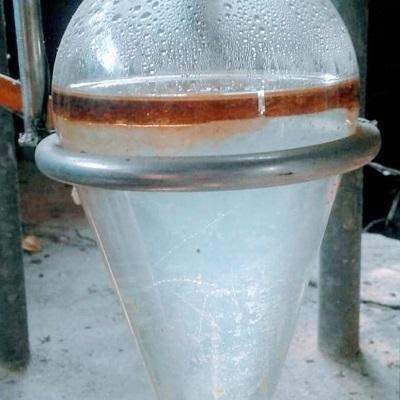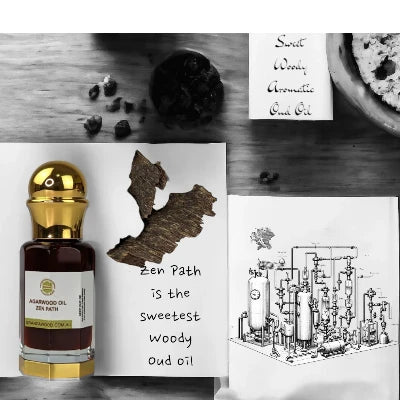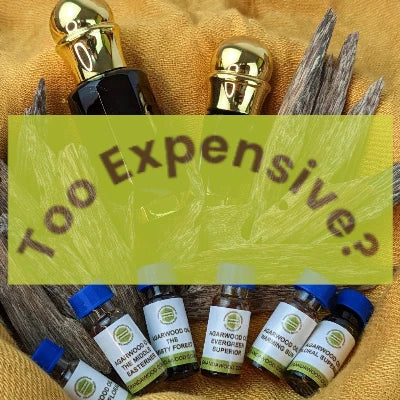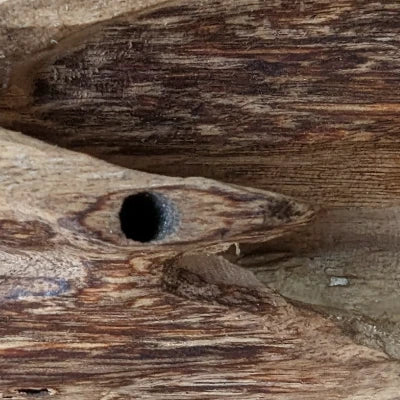Menu
-
-
F.A.Q
- How to identify genuine agarwood chip, natural or cultivated
- How to identify oil injection / absorption fake agarwood beads
- How to know if there are more than one oil in your oil
- How to make your wood bracelet or mala darker
- How to tell if an Agarwood bead sinks WITHOUT sinking it under water?
- How does back flow incense work and how do you burn it?
- Where to start if you don't know what agarwood is ?
- Why are you losing money if you buy seeds and plants?
- Which agarwood incense should I choose?
- Frequently Asked Questions
- Agarwood Related Articles
- Shipping
-
SHOP - Agarwood
-
SHOP - Other Fragrant Wood
-
SHOP - Incense Holder and Burner
-
- FREE guide book
- Testimonials
- "Why did you buy this?"
- Contact us
- About Us
- +61430284329
- Login
-
English


What type of Agarwood Oil (Oud/ Oudh) should be used to make perfume? Cultivated or Wild Oud?
April 25, 2019 5 min read
Common issues when using oud in your perfume creation
Wild vs cultivated agarwood (oud) oil

Most of the time, the use of wild agarwood oil in perfumery is very limited and restricted. It is suitable for a one-off project

Agarwood (Oud) oil is a very selective ingredient for perfumers. Before thinking of having this ingredient in your concoction, it makes sense to know what it smells like. Why? you may ask? Because of the nature of this product, different plantation, different suppliers, growers, different parts of the trees will provide a different scent profile. If you choose Oud as an ingredient, you need to develop your perfume around it and stick with it for consistency. One of the most important questions of all: "Can I sell it to my audiences/ customers?", "And if they want more, can I supply them with consistency?"
Oud blending is an art that not many ones can master because one of the main reasons is the "unpleasant" scent of oud, known as "barnyard", "decomposed", "animalic", "poop", "dirty". This "unpleasant" scent, if handled well, will make the scent so irresistible. This is particularly true when making incense
"What interests me in particular . . . are bad smells. Chrysanthemum flowers that
smell ‘raw’ (aokusakute). They aren’t in any way nice, are they? And the autumn
kamemushi beetle that sends out a stink when you touch it by mistake. Ugh!
Also, bamboo leaves, which smell horribly when cut. But it is really important to
know smells like these because, if you can put in a little bit of a bad smell into a
fragrance, then that fragrance can become fantastic. There are hints like these for
me everywhere in my everyday life. So my principle is, first find strange smells
and stinky smells, for they can provide you with crucial hints when making a new
incense." (Moeran 2007, page 153)
However, as everyone is different, if you know your customers who only want pleasant notes, we can also cater to this niche for you. With different "fermented", and "cured" technique, along with different agarwood chips, we can make oud oil more appealing to enjoy, of course with 100% pure oud oil. So again, if you are from the Middle East and you like a bit of creamy, leathery and good barnyard in your perfume, we have you covered.
If your audiences/ customers were not used to the oud smell, or never smelled it before, they may not like the oud oil alone but would be enjoying its blend in a perfume. For someone who is new to oud (agarwood) oil, it takes time to learn, get used to the smell, and eventually love it.
It takes time to create your oud perfume. It even takes a greater deal of time to spread your brand our there for your audience/customer accept your products. Imagine you found the right formula and your creation flew off the shelf, how do you feel when you want more oud but found out that your supplier was unable to provide the same (or at least similar) original batch. What should you do? Create a new formula, facing the unknown? Or change the supplier? Or even both?
Common issues when importing Oud

If you were in Europe, and you would like some oud to create a high-end perfume, would the below sound similar:
- Long process to apply for import CITES (up to 4 weeks)
- The oud suppliers provide a different batch compared to the original sample and still insisted it was the same despite the fact that it smells completely different. You are told that they had been doing this for years.
- You tried to return the product, however, and the CITES is required for import/export, it takes a lot of time to apply the CITES again to return that to the supplier. However, the supplier is unable to receive it back because it required another CITES from them to re-import which they need to explain to the authority why they need to do so.
- You are confused and so is the supplier. The paperwork is a mess. The authority is now involved.
- What about the customs duty you already paid when you import this oud? How do you claim it back when you return it to the supplier? How long does it take for the supplier to accept the return goods and refund back to you? Eventually, you are burned as it is an expensive exercise
Isn't it painful when facing these issues? Your energy should be used in making your perfume not in solving the above issues. So if you want agarwood oil for perfume making, let us know to see if we can work something out.
Send us an email info@grandawood.com.au
Leave a comment
Comments will be approved before showing up.
Also in News

Anoint with The Zen Path, and you will never yearn for the artificiality that numbs the senses
March 03, 2024 2 min read

You say: “Your Agarwood is too expensive”. Let’s Reason Together - about Price
February 14, 2024 8 min read
